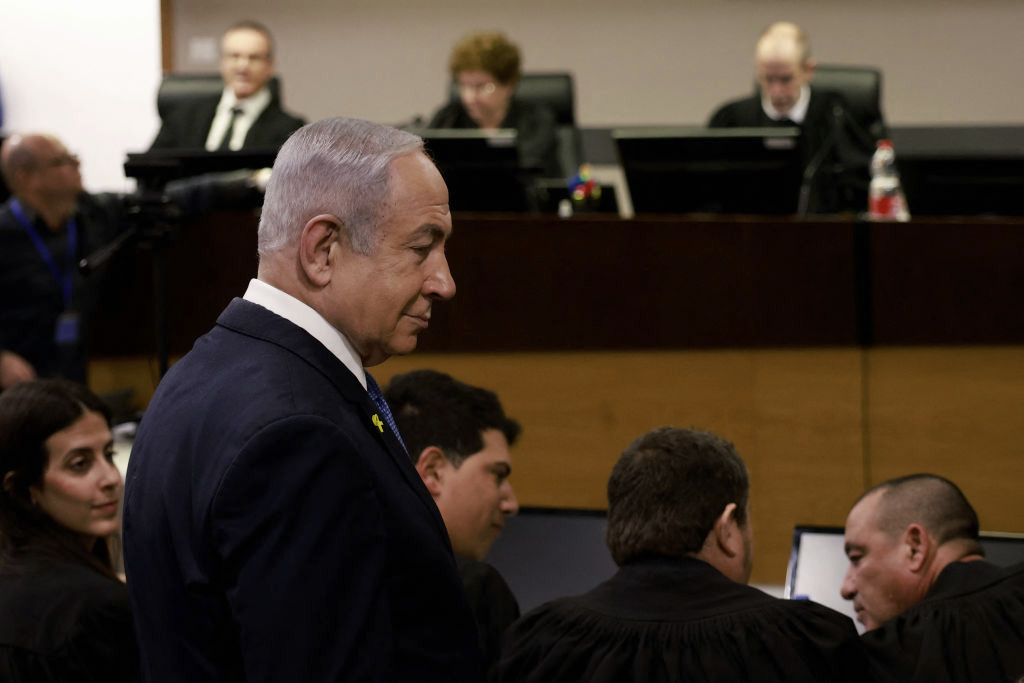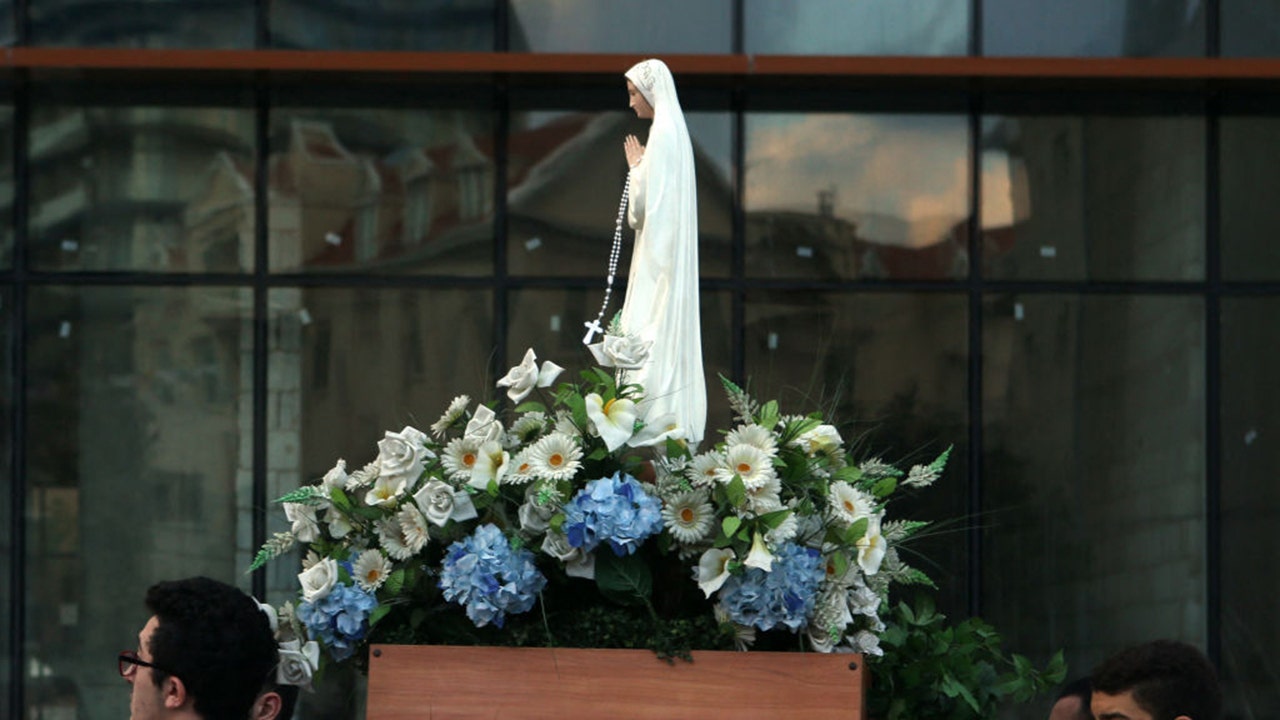 Some might view the judicial escapade against Israeli Prime Minister Benjamin Netanyahu, in cases of trumped-up charges, as political payback for the prime minister's having tried to reform the judicial system after he was last re-elected in 2022. The judicial reforms are desperately needed. Do these judges actually want Israel to lose the war just so they can keep their absolute power? Pictured: Netanyahu enters the district court in Tel Aviv at the start of his hearing on December 10, 2024. (Photo by Menahem Kahana/Pool/AFP via Getty Images)
Some might view the judicial escapade against Israeli Prime Minister Benjamin Netanyahu, in cases of trumped-up charges, as political payback for the prime minister's having tried to reform the judicial system after he was last re-elected in 2022. The judicial reforms are desperately needed. Do these judges actually want Israel to lose the war just so they can keep their absolute power? Pictured: Netanyahu enters the district court in Tel Aviv at the start of his hearing on December 10, 2024. (Photo by Menahem Kahana/Pool/AFP via Getty Images)
Israeli Prime Minister Benjamin Netanyahu deserves an award for successfully leading the war against Iran's "Axis of Resistance" in the Middle East. He has not earned the title "The Churchill of the Middle East" for nothing.
Since the October 7, 2023 Hamas-led attack on Israel, during which 1,200 Israelis were murdered and thousands injured, Israel has destroyed most of the terror group's military capabilities in the Gaza Strip and eliminated its top political and military leaders, including Ismail Haniyeh and Yahya Sinwar.
In Lebanon, Israel has also dealt a severe blow to the Iran-backed Hezbollah terror group, which unleashed a wave of rocket and drone attacks on communities in northern Israel starting the day after the October 7 atrocities. The Israel Defense Forces (IDF) -- in defiance of threats from the Biden administration to withhold badly needed military supplies if Israel tried to neutralize threats against it (such as here, here, here, here and here) -- succeeded in eliminating most of Hezbollah's political and military leaders, including the group's secretary-general, Hassan Nasrallah.
Similarly, Israel launched two successful air strikes against Iran over the past few months. The attacks came after Iran had fired hundreds of missiles and attack drones at Israel.
Israel also carried out similar air strikes against Iranian-backed militias in Syria and Yemen.
In the West Bank, the Netanyahu government declared war on various Iran-backed armed groups affiliated with Hamas and Palestinian Islamic Jihad. In the past year, the IDF killed or arrested hundreds of Palestinian terrorists, especially in the northern West Bank cities of Jenin, Tulkarem, Nablus and Tubas.
It was thanks to Netanyahu's relentless war against the Iranian regime and its proxies that the Syrian regime of President Bashar Assad collapsed in early December. In the past, Iran and Hezbollah had helped Assad to crush his opponents. This time, Iran and Hezbollah were not able to do anything to save the Syrian dictator. The mullahs in Tehran seem to have absorbed the lesson that provoking Israel comes with a heavy price.
Hezbollah, as a result of its war against Israel, was weakened to the point that it was unable to dispatch its men to fight the anti-Assad rebels as it had been able to do in the past. During its 14-month war on Israel, Hezbollah lost thousands of its men and most of its military infrastructure.
Israel's efforts to defend itself from Iran's "Axis of Resistance," however, are far from over. Iran, Hamas, Hezbollah, the Houthis in Yemen and Jihadist groups in Syria and Iraq continue to pose a serious threat. The IDF remains on high alert and Netanyahu continues to work around the clock to remove this threat once and for all.
Since the Turkish-backed Jihadist takeover of the Syrian regime, the dangers Israel faces have not diminished. As initially the greatest fear in Israel was that Assad's weapons would fall into the hands of Syria's new rulers, most of whom are Jihadists affiliated with Al-Qaeda and Islamic State (ISIS), Netanyahu ordered the Israeli military to take immediate preemptive measures, including destroying Syrian military bases and chemical weapons labs. He also instructed the IDF to enter the buffer zone along Israel's border with Syria to prevent Jihadists from carrying out another October 7-type of invasion of Israel. So far, at least, these measures have proven effective.
Netanyahu is now facing a grotesque challenge that could derail Israel's war against Iran, Turkey and their terror proxies. The attempted sabotage is coming not from them, but from Israel's own judicial system.
Recently, Israeli judges turned down Netanyahu's request to delay his testimony in court, where he is standing trial for charges including breach of trust, accepting bribes (cigars and champagne) and fraud. The Israel Police began investigating Netanyahu in December 2016 and subsequently recommended indictments against him. Despite the charges, Netanyahu has since been re-elected as prime minister more than once, an indication that a majority of Israelis continue to view him as their preferred candidate for the job.
What is lethal for the country is that the judges ruled that Netanyahu must appear in court three times a week for at least six consecutive hours each time. All this when the prime minister is preoccupied with the multi-front war against Israel by Iran, its terror proxies, and now Turkey, which no doubt sees its proxy-invasion of Syria as a pathway to Turkish Prime Minister Recep Tayyip Erdogan's long-term dream to "liberate Jerusalem from the Jews."
Attempts by Netanyahu's lawyers and other senior Israeli government officials to explain to the judges that dragging the prime minister to court during these extremely dangerous times is harmful to Israel's national security, have fallen on deaf ears. Needless to say, Netanyahu has complied with the court ruling. He began his testimony last week and will continue to appear before the court in the next few weeks.
Some might view this judicial escapade, in cases of trumped-up charges, as political payback for Netanyahu's having tried to reform the judicial system after he was last re-elected in 2022. The judicial reforms are desperately needed, but would diminish the absolute power that Supreme Court judges arrogated to themselves starting in the 1990s, and which they appear autocratically determined to keep.
The court's insistence that Netanyahu spend several hours a day testifying demonstrates a contempt not just for him, but for the security of the country. The judges could have at least reduced the court appearances to once or twice a week, but they chose to ignore warnings that Israel is at war and that the prime minister might need to spend time with his cabinet ministers and generals instead of testifying about cigars and champagne that he allegedly received from friends as gifts.
"I work 17-18 hours a day," Netanyahu told the court during his first testimony session.
"I eat my lunch at my desk. Waiters in white gloves don't serve me meals. I work around the clock, into the small hours. I usually go to sleep at around 1 or 2 in the morning and have almost no time to see family or children. Now and then, I sin with a cigar, which I can't smoke at length because I'm always in meetings and briefings... By the way, I loathe champagne; I simply don't like it and I can't drink it."
Do these seemingly vindictive judges really think that Netanyahu's cigars and champagne are not more important than Israel's war against Iran's "Axis of Resistance"? The judges also appear to have forgotten that Netanyahu is also trying to secure the release of 100 Israeli hostages who have been held in the Gaza Strip since October 7, 2023 by Hamas and other terrorist groups.
Israel and the West would be far better off to see Netanyahu sitting with his security and military advisors to discuss ways of further neutralizing Israel's enemies and releasing the hostages, rather than wasting his time explaining why he accepted cigars and champagne from friends. No one is saying that the charges against Netanyahu should be dropped. The trial has been going on for eight years. There is no reason for the prime minister to spend several hours a day in court now, when Israel is at war and he is successfully protecting his people from enemies seeking his country's destruction and the murder of all Jews.
Do these judges actually want Israel to lose the war just so they can keep their absolute power?
The trumped-up charges against Netanyahu are seen by many Israelis in the context of a politically-motivated campaign undemocratically to remove him from government.
Unfortunately, it appears that some in the Israeli judicial system have chosen to be part of this campaign. They do not seem to realize that Netanyahu's war on the Iranian regime and its terror proxies is good not only for Israel, but also for many Arabs and Westerners falling victim to Turkey's latest assaults in Syria and the Iranian mullahs' scheme to export their "Islamic Revolution" throughout the world.
Bassam Tawil is a Muslim Arab based in the Middle East. His work is made possible through the generous donation of a couple of donors who wished to remain anonymous. Gatestone is most grateful.

 By Gatestone Institute | Created at 2024-12-15 10:10:34 | Updated at 2024-12-15 12:35:39
2 hours ago
By Gatestone Institute | Created at 2024-12-15 10:10:34 | Updated at 2024-12-15 12:35:39
2 hours ago







